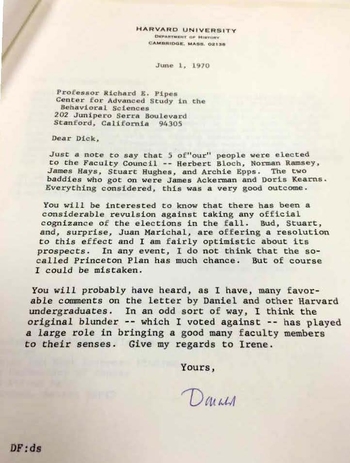To the Editor:
The vote of the Harvard faculty on May 6 meant, for some of Harvard's students, the culmination of a process of disillusionment with the university which has been going on for some time. The vote which allows students to choose not to complete their academic year to receive credit for their courses, marks a complete abandonment of academic standards by a university faculty previously considered among the world's greatest.
As bad as what the faculty did was the way in which they did it. The faculty meeting was hastily called, the motions poorly drafted, the debate unworthy of being called rational. Despite the pretense of discussion, the reality of the situation was a collapse under student pressure which was hardly even disguised.
There is a lot of talk about conscience and concern, about "these times of crisis." The carnival atmosphere here mocks such phrases.
However one may feel about national and international politics, they are no reason to abandon the enterprise of teaching and learning. [Editorial May 13.]
We came to Harvard with a deep respect for the academic standards and leadership of its faculty. If our Harvard education has taught us anything, it is how wrong we were.
Arthur Waldron, '71
Daniel Pipes, '71
Alice Galenson, '70
Louise Martin, '71
David Galenson, '72
Cambridge, Mass., May 6, 1970
May 21, 1970 update: A reply titled "Activism at Harvard" appeared in the New York Times.
To the Editor:
In response to the May 14 letter from five Harvard and Radcliffe students. we firmly support the decision of the Harvard faculty of Arts and Sciences to allow students broad latitude in the way in which they fulfill their course requirements for this semester. The academic freedom of those who chose to continue to study is entirely protected.
It is our sense that the faculty decision has wide support in the student community. A carnival atmosphere does not exist among students: over 1,000 students and faculty have been to Washington and more are planning to go. Groups of students leave Cambridge at 5:30 A.M. to canvas factories. Canvassers are active on subways each morning and evening, and bases of student political organization are being formed in all fifty states.
A majority of students are acting constructively and responsibly at a time when their conscience :requires that they willingly make sacrifices in order to effect changes in Government policy. We feel that the present crisis requires that we devote full time to the problems of militarism and repression in this country. If our Harvard education has taught us anything, it is that to realize the ideals of our society, the university community must become an active rather than a passive participant.
George B. Mallory Jr.
Robert M. Seyfarth Jr.
Cambridge. Mass., May 15, 1970
June 1, 1970 update: In a letter about recent developments at the university, Donald Fleming of the History Department wrote to my father, Richard Pipes: "You will probably have heard, as I have, many favorable comments on the letter by Daniel and other Harvard undergraduates." (With thanks to Jonathan Daly, University of Illinois at Chicago, for this reference.)
